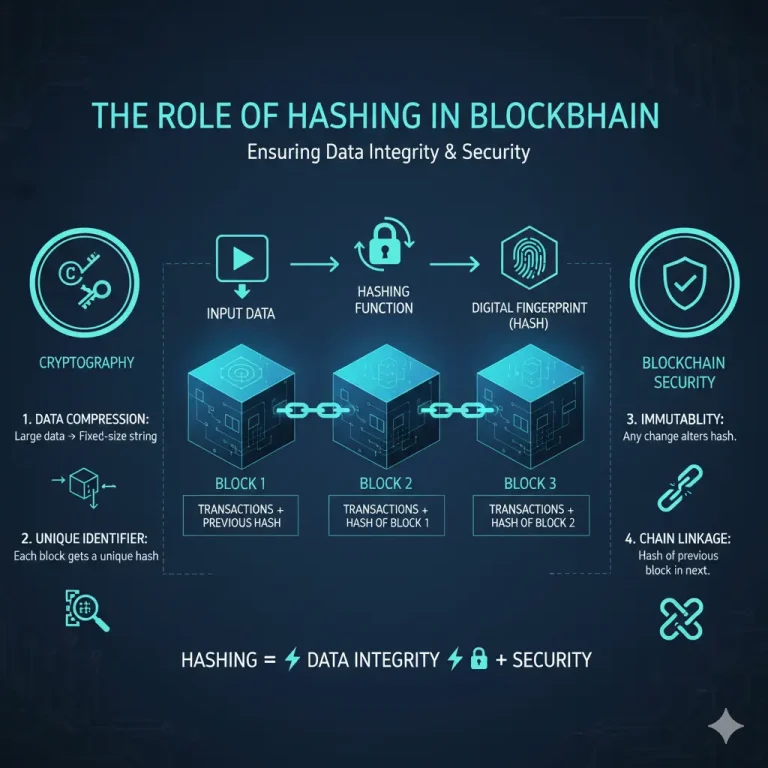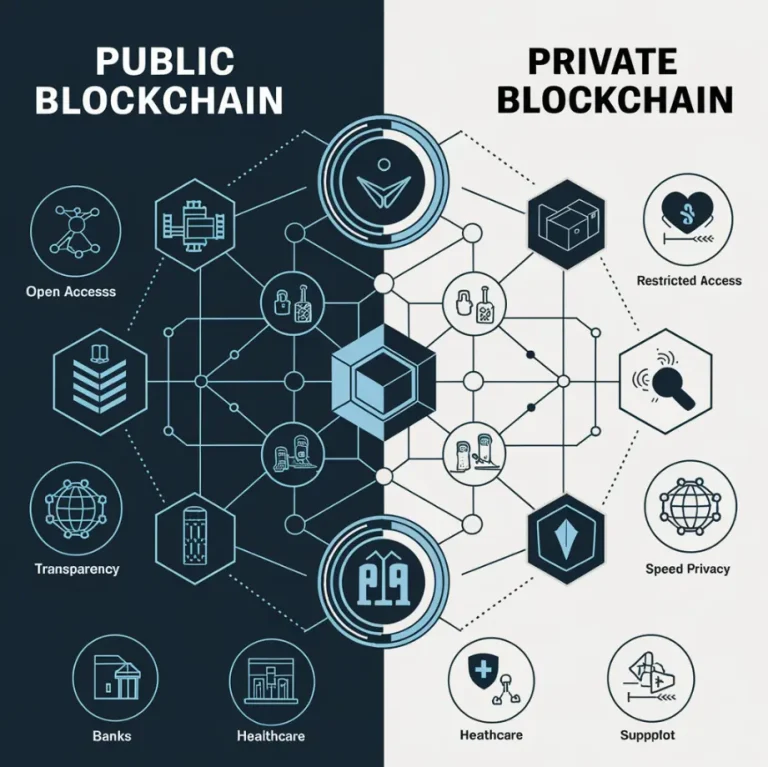How Can Features of Blockchain Support Sustainability Efforts?

At its core, blockchain is a distributed ledger technology that eliminates the need for intermediaries, ensuring data accuracy and trust. By fostering decentralization, blockchain empowers industries to adopt sustainable practices, from waste management to renewable energy initiatives. How can features of blockchain support sustainability efforts This technology bridges the gap between technological innovation and environmental responsibility.
Blockchain’s Role in Sustainability:
Blockchain’s potential lies in its ability to streamline processes, increase transparency, and provide reliable traceability. For eco-conscious organizations and individuals, it serves as a powerful tool for monitoring carbon footprints, ensuring ethical sourcing, and combating environmental fraud.
Key Features of Blockchain Technology:

- Transparency: Blockchain enables real-time monitoring and reporting of environmental data, fostering accountability across industries.
- Decentralization: By distributing control, blockchain reduces risks associated with centralized systems and supports decentralized governance.
- Security: The immutable nature of blockchain ensures the integrity of data, making it a reliable tool for environmental reporting.
- Smart Contracts: These programmable contracts automate processes like carbon credit trading and renewable energy transactions.
- Traceability: Blockchain’s ability to track assets and resources enhances recycling, waste management, and sustainable supply chains.
Decentralization and Sustainability:
Decentralization eliminates reliance on centralized systems, which are prone to inefficiencies and corruption. In sustainability efforts, decentralization ensures equal participation, empowering communities to collaborate on environmental projects without the need for intermediaries.
Transparency Through Blockchain:
Blockchain’s transparent nature is revolutionizing industries by enabling consumers to verify claims of ethical sourcing, fair trade, and eco-friendly practices. For instance, blockchain can trace the journey of food from farm to table, ensuring that it meets sustainability standards.
Smart Contracts for Sustainability: Automating Green Solutions
Smart contracts are digital agreements that execute automatically when predefined conditions are met. They can facilitate green finance initiatives, automate carbon credit exchanges, and incentivize sustainable practices through reward systems.
Blockchain’s Role in Tracking Environmental Impact:
With blockchain, organizations can track resources and their environmental impact. For example, companies can use blockchain to monitor their carbon emissions and make data-driven decisions to reduce their environmental footprint. This traceability fosters accountability and empowers investors to support eco-friendly projects.
Energy Markets with Blockchain Technology:
Blockchain enables peer-to-peer energy trading, where consumers can buy and sell renewable energy directly. This decentralized approach promotes efficient energy distribution, reduces wastage, and fosters the adoption of renewable energy sources like solar and wind power.
How Blockchain is Transforming Waste Management and Recycling Processes:
By enhancing traceability, blockchain ensures that waste is appropriately managed and recycled. Organizations can track the lifecycle of products and ensure compliance with environmental regulations, reducing pollution and conserving resources.
Reducing Carbon Emissions with Blockchain:
Blockchain’s transparent and traceable features make it ideal for tracking carbon emissions. Organizations can identify inefficiencies by recording emissions data on a blockchain and implementing strategies to achieve net-zero goals.
Blockchain’s Contribution to Building Circular Economies:
Blockchain facilitates circular economies by promoting resource efficiency and recycling. Through smart contracts and traceability, businesses can reduce waste and ensure that materials are reused, minimizing their environmental impact.
Ethical Supply Chains Through Blockchain Innovations:
Ethical supply chains are critical for sustainability. Blockchain ensures that every step of the supply chain, from raw material sourcing to final delivery, adheres to environmental and ethical standards.
Mitigating Greenhouse Gas Emissions Through Blockchain-Based Solutions:
Blockchain enables organizations to track and reduce their greenhouse gas emissions. By integrating blockchain with IoT devices, real-time data can be recorded, analyzed, and used to mitigate climate change.
Climate Accountability Made Easy:
With blockchain, businesses can track their carbon footprints transparently and share progress with stakeholders. This fosters trust and drives collective action towards sustainability goals.
Leveraging Blockchain for a Net-Zero Future:
While blockchain offers immense potential, its energy-intensive nature remains a challenge. Transitioning to eco-friendly blockchain networks and adopting energy-efficient algorithms can help overcome this hurdle, paving the way for a net-zero future.
Blockchain’s Role in Green Investments and Inclusion:
Blockchain enables green finance by facilitating transparent and efficient transactions. It also supports financial inclusion, empowering underserved communities to access resources and contribute to sustainable projects.
Blockchain in the Energy Sector:
In the energy sector, blockchain enhances the management of renewable energy grids. It ensures that electricity generated from clean sources is efficiently distributed, reducing dependency on fossil fuels.
The Intersection of Blockchain, Food Systems, and Environmentalism:
Blockchain promotes sustainability in food systems by ensuring transparency and traceability. Consumers can verify the origin of their food, ensuring that it meets environmental and ethical standards.
Pioneering Blockchain Innovations for a Sustainable Tomorrow:
Innovations in blockchain, such as decentralized energy grids and carbon credit marketplaces, are driving the transition to a sustainable future. These advancements offer scalable solutions for addressing global environmental challenges.
Blockchain’s Real-World Impact on Climate Action:
While cryptocurrency is a popular application of blockchain, its real-world impact on climate action is even more significant. Blockchain’s ability to enhance transparency, accountability, and efficiency makes it a valuable tool for combating climate change.
Driving Energy Efficiency in the Blockchain Era:
Blockchain’s evolution is making strides toward energy efficiency. Technologies like proof-of-stake (PoS) reduce energy consumption, aligning blockchain networks with sustainability goals.
Can Blockchain Be Truly Eco-Friendly?
To achieve eco-friendliness, blockchain must address its energy usage. Adopting renewable energy for mining operations and developing low-energy consensus mechanisms are key steps toward making blockchain sustainable.
Blockchain Adoption in Environmental Projects:
Despite its potential, blockchain adoption in environmental projects faces challenges like scalability, regulatory hurdles, and public awareness. Collaborative efforts among stakeholders can address these barriers and maximize blockchain’s impact.
Balancing Security and Sustainability:
While blockchain’s security is unparalleled, it often comes at the cost of high energy consumption. Striking a balance between security and sustainability is essential for its long-term adoption.
FAQs:
How Can Blockchain Be Used to Support Sustainability?
Blockchain can support sustainability by enhancing transparency, ensuring traceability in supply chains, automating carbon credit systems with smart contracts, and enabling peer-to-peer energy trading. These applications promote efficient resource use and accountability in environmental efforts.
How Can Features of Blockchain Support Sustainability Efforts Brainly?
Blockchain’s features such as decentralization, traceability, and smart contracts create systems that foster sustainable practices. For instance, blockchain enables ethical sourcing, tracks carbon footprints, and supports green finance initiatives to combat climate change effectively.
What Is the Role of Blockchain in Sustainable Development?
Blockchain plays a pivotal role in sustainable development by providing transparent systems for tracking environmental impacts, enabling decentralized collaboration, and fostering green investments. Its ability to enhance accountability aligns with global sustainability goals.
How Blockchain Is Helping the Environment?
Blockchain helps the environment by promoting renewable energy markets, reducing greenhouse gas emissions, ensuring ethical supply chains, and tracking waste management. Its transparency and automation capabilities make it a powerful tool for environmental conservation.
Can Blockchain Help With Sustainable Project Management?
Yes, blockchain can streamline sustainable project management by ensuring transparency, automating workflows through smart contracts, and fostering stakeholder collaboration. It also enhances accountability by providing a reliable record of project activities.
Which Blockchain Is Most Environmentally Friendly?
Blockchains using proof-of-stake (PoS) consensus mechanisms, such as Ethereum 2.0 and Algorand, are considered environmentally friendly due to their significantly lower energy consumption compared to proof-of-work (PoW) systems.
How Do You Make Blockchain Eco-Friendly?
To make blockchain eco-friendly, developers can adopt energy-efficient consensus mechanisms like PoS, utilize renewable energy sources for mining operations, and design low-energy algorithms. These steps reduce blockchain’s environmental footprint.
How Is Blockchain Impacting the World?
Blockchain is revolutionizing industries by enhancing transparency, decentralization, and efficiency. It impacts the world by supporting financial inclusion, improving supply chain management, and enabling innovative solutions to global challenges like climate change.
What Is Decentralization in Blockchain Technology?
Decentralization in blockchain technology refers to the distribution of control across a network, eliminating central points of failure and enhancing security. It streamlines processes and supports decentralized governance.
How Can Blockchain Be Used in Renewable Energy Tracking?
Blockchain can track renewable energy production and consumption through immutable records. This ensures transparency and enables peer-to-peer energy trading, promoting the adoption of clean energy sources.
What Are the Benefits of Implementing Blockchain in Sustainability Efforts?
Blockchain enhances sustainability by providing transparency, enabling traceability, automating processes with smart contracts, and fostering collaboration.







